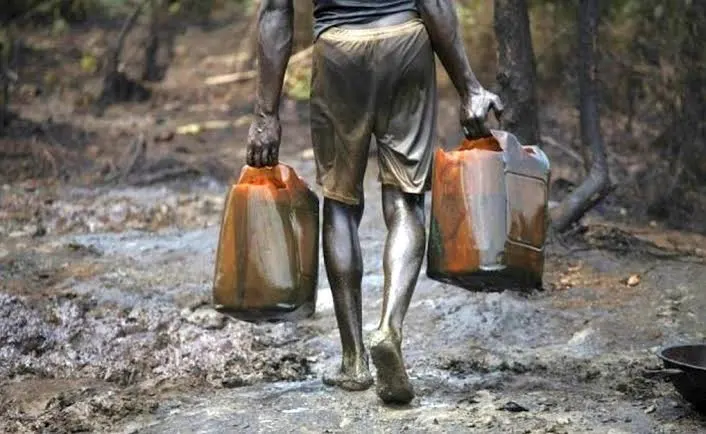Nigeria, endowed with some of the world’s largest proven oil reserves, finds itself at a crossroads as it grapples with the escalating issue of crude oil theft. The recent removal of government fuel subsidies has exacerbated this problem, leading to increased illegal activities in the country’s oil-producing regions, particularly in the Niger Delta. With approximately 90 percent of Nigeria’s revenue dependent on oil exports, the consequences of this surge in theft are far-reaching and demand immediate attention.
The Nigerian National Petroleum Corporation (NNPC) reported a disturbing surge in crude oil theft between September 23 and 29, 2023, documenting 170 occurrences across various regions. This spike is indicative of a broader challenge that undermines the nation’s economic stability. The impact is not only financial but also operational, contributing to a decrease in oil production, disruptions in the supply chain, and an environment that discourages foreign investment.
The economic toll of crude oil theft is staggering. Reports from the Nigerian Extractive Industries Transparency Initiative reveal that Nigeria lost 619.7 million barrels of crude, valued at $19.24 billion, between 2009 and 2020. Former petroleum minister Timipre Sylva acknowledged that theft amounted to approximately 400,000 barrels per day, a figure that has only risen since the removal of fuel subsidies. This loss directly affects the federal government’s ability to meet financial obligations, hindering debt financing, fuel subsidies, and the execution of major capital projects.
Legal and industry experts, including Ayodele Oni of Bloomfield Law, emphasized the economic and operational damage inflicted by crude oil theft. The hostile environment created by these losses deters upstream investors, leading to shutdowns, reduced production rates, and a vicious cycle of economic decline. Jide Pratt, an energy sector consultant, underscored the imperative of reducing oil theft to zero, emphasizing the need for committed efforts from community leaders and security outfits.
To combat crude oil theft effectively, experts advocate a multi-faceted approach. They said tightening security in the Niger Delta, deploying modern technology to monitor pipelines, and tracking theft and perpetrators are crucial steps. They also say the government must address the root causes of this illegal activity, including poverty in oil-producing regions, corruption, and weak legal frameworks. “This necessitates decisive security and legal action to end oil theft and create better opportunities for locals,” according to a Niger Delta chieftain, Harry Wilson.
The recent tragedy in Rivers state, where an explosion occurred at an illegal oil refining site, resulting in multiple casualties, underscores the urgency of addressing this issue. While illegal refining, known as “oil bunkering,” remains rampant, the government’s response should prioritize security measures, legal reform, and community development.
Adding, a financial economist at Ebonyi State University, Dr. Nelson Nkwo, told NATIONAL ECONOMY that the fight against crude oil theft in Nigeria requires a comprehensive and sustained effort. “Beyond immediate security measures, addressing the socio-economic and systemic issues that fuel this illicit activity is paramount. Only through collective determination, legal reforms, and community development can Nigeria reclaim its economic stability and secure a more sustainable future,” he said.
Buttressing that point, Professor Tayo Bello of Adeleke University, noted that the government needs to strengthen security forces in the Niger Delta region, deploying well-trained personnel to critical areas prone to oil theft. He also called on the government to utilize advanced surveillance technologies such as drones, satellite monitoring, and sensor networks to detect and deter criminal activities.
On his part, a security expert, Paul Igbrude, called for community engagement and empowerment. He noted that while community engagement has been captured in the Petroleum Industry Act (PIA), the enforcement aspect has not yet taken the front burner. “Foster collaboration with local communities, involve them in the protection of oil infrastructure, and make them stakeholders in the industry. Implement community development projects to address socio-economic challenges; it will reduce the incentive for involvement in oil theft,” he said.
However, Charles Nathaniel, a legal practitioner, called for the review and strengthening of existing laws related to oil theft to ensure that legal frameworks provide effective deterrents. He also called for the establishment of a specialized task force or court to handle cases related to oil theft to ensure swift and effective prosecution.
He cited the urgency to invest in state-of-the-art technology for monitoring and securing oil pipelines, including real-time tracking systems and smart sensors. “Collaborate with technology experts and companies to develop and implement innovative solutions tailored to Nigeria’s unique challenges,” he stated.
Also speaking with NATIONAL ECONOMY, a financial economist at Nnamdi Azikiwe University, Dr. Felix Echekoba, noted the importance of investing in the upgrade and maintenance of oil infrastructure, making pipelines more secure and resistant to tampering. He said oil companies should implement regular inspections and maintenance schedules to identify vulnerabilities and proactively address potential risks.
He also encouraged corporate social responsibility initiatives that contribute to community development and reduce the appeal of oil theft.
He stated that by embracing this strategic roadmap, Nigeria can work towards eliminating oil theft and vandalism, securing its valuable resources, and fostering sustainable economic growth in 2024 and beyond. “The key lies in a holistic and collaborative approach that addresses the root causes and implements effective, technology-driven solutions,” he stated.





